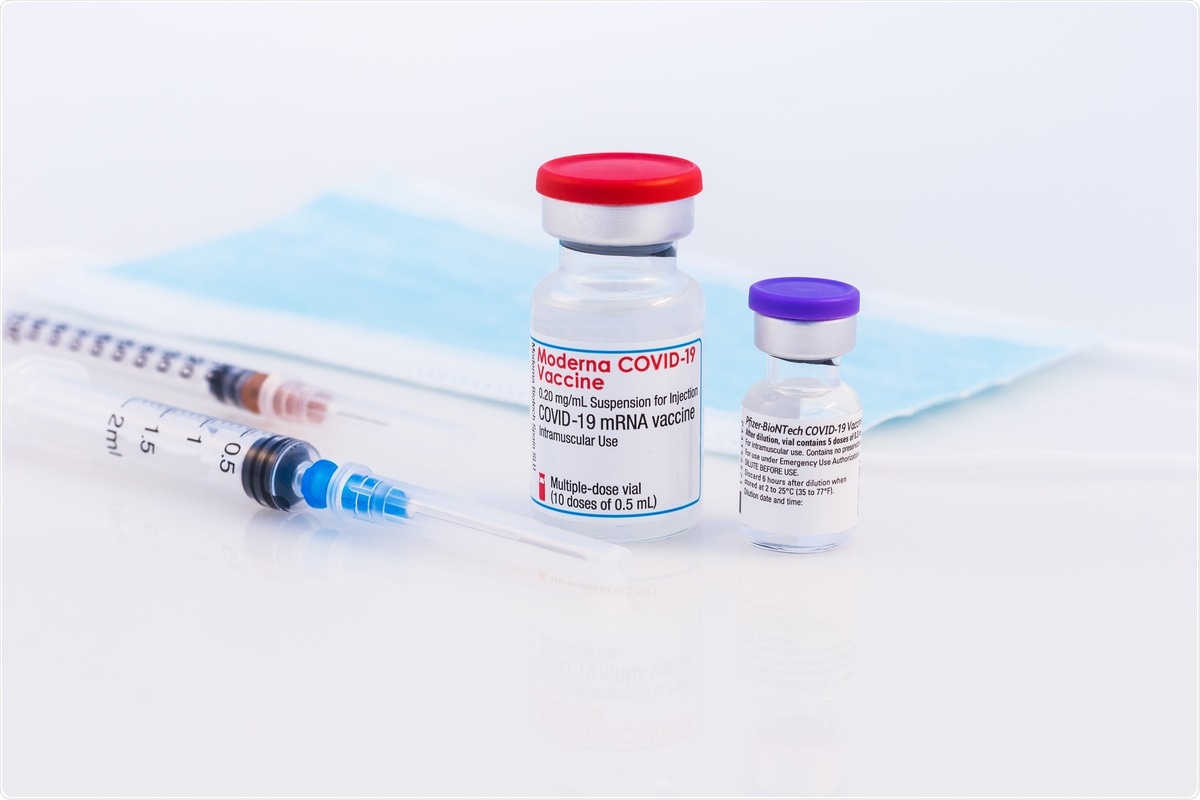The perseverance of scientists worldwide has led to the rapid development of many SARS-CoV-2 (severe acute respiratory syndrome coronavirus 2) vaccines and provided preventative measures against the coronavirus 2019 (COVID-19) pandemic. However, there have been many cases of breakthrough infections, owing to the emergence of variants of concern (VoC), and scientists have noted some differences across mRNA platforms (BNT162b2 and mRNA1273). A new study available on the bioRxiv* preprint server analyzed the differential post-boost binding and functional capacity of the humoral response induced by the BNT162b2 (Pfizer-BioNTech) and mRNA-1273 (Moderna) vaccines.
 Study: Subtle immunological differences in mRNA-1273 and BNT162b2 COVID-19 vaccine induced Fc-functional profiles. Image Credit: Izabela23/ Shutterstock
Study: Subtle immunological differences in mRNA-1273 and BNT162b2 COVID-19 vaccine induced Fc-functional profiles. Image Credit: Izabela23/ Shutterstock

 This news article was a review of a preliminary scientific report that had not undergone peer-review at the time of publication. Since its initial publication, the scientific report has now been peer reviewed and accepted for publication in a Scientific Journal. Links to the preliminary and peer-reviewed reports are available in the Sources section at the bottom of this article. View Sources
This news article was a review of a preliminary scientific report that had not undergone peer-review at the time of publication. Since its initial publication, the scientific report has now been peer reviewed and accepted for publication in a Scientific Journal. Links to the preliminary and peer-reviewed reports are available in the Sources section at the bottom of this article. View Sources
A preprint version of the study is available on the bioRxiv* server while the article undergoes peer review.
Background
Antibodies mediate a range of protective functions, in addition to binding and neutralization. They can do so due to their ability to recruit the immune system through Fc receptors. Fc-effectors have been shown to protect against SARS-CoV-2, similar to other pathogens, such as influenza. They mainly reduce disease severity rather than preventing transmission. Whether mRNA platforms can elicit Fc-effector functions or not is a matter of ongoing research.
The BNT162b2 and the mRNA1273 showed similar efficacy in phase 3 trials, but the real-world data paints a somewhat different picture. As an example, in the face of the Delta variant, the above two vaccines have been seen to be about 40% and 75% effective, respectively. Preliminary data show differences in humoral responses between the two mRNA vaccines; however, more research is required to draw firm conclusions.
A new study
In the current study, scientists compared the humoral responses elicited by the Pfizer-BioNTech and Moderna vaccines in a group of hospital staff. Seventy-three individuals (28 receiving mRNA-1273 and 45 receiving BNT162b2) were included, and these individuals had serum available for analysis following their second vaccine dose. Scientists analyzed the wild-type SARS-CoV-2 RBD-, N-terminal domain (NTD), S-, S1- and S2-specific antibody titers, Fc-receptor binding, and Fc-functions.
The two mRNA vaccines induced robust antibody titers and neutralization, with the mRNA1273 vaccinees showing slightly higher responses. The presence of IgG and IgM binding titers were equivalent, but mRNA1273 elicited higher levels of IgA binding titers, particularly to the Spike, RBD, NTD, and S1 domains. Both vaccines showed largely similar Fc-receptor binding, with the only exception being the enhanced NTD-specific Fc-receptor binding antibodies induced by the Moderna vaccine.
There was not much difference between the two vaccines in antibody-dependent complement deposition (ADCD) and antibody-dependent cellular phagocytosis by monocytes (ADCP). The antibody-dependent neutrophil phagocytosis (ADNP) and antibody-dependent NK cell activation were significantly higher in-hospital staff vaccinated with the mRNA1273 vaccine. It remains unclear if these differences lead to different efficacy and should be addressed in long-term follow-up breakthrough studies.
Scientists observed that the RBD depletion did not hinder the Fc-effector function in convalescent individuals or BNT162b2, mRNA-1273, and RBD-specific antibodies did not contribute much to ADCP mediated activity across the VOCs. Epitope-specific functional programming across mRNA vaccines occurs, as suggested by the fact that RBD-specific antibodies contributed more to ADNP activity across the VOCs. This effect was more pronounced in individuals immunized with the mRNA1273 vaccine.
The study also found that RBD-specific antibodies may block Fc-effector function in natural infection. The data also reveal vaccine and infection-induced differences in Fc-programming at an epitope-specific level. It is important to understand the relationship between epitope-specificity, non-neutralizing antibody functions, and clinical protection. This knowledge will help in planning boosting efforts and, in turn, stop the emergence of variants of concern.
Conclusion
The current study showed the ability of the BNT162b2 and mRNA-1273 vaccines to induce robust Fc-effector functions, which has been linked to the mitigation of severe disease in unvaccinated individuals. It is crucial to understand the differences between the two vaccines in terms of their transmission-blocking ability. This will help develop more potent vaccines that would provide protection for much longer, which would, in turn, reduce the speed of the emergence of VoC.
More research is required to provide a holistic recognition of the role of the Fc-effector function in protecting against SARS-CoV-2 infection. Future immune correlate analyses and breakthrough studies will be aiming to achieve just that, and the current study is a step in that direction. It shows the differences in the humoral responses, elicited by the Moderna and Pfizer-BioNTech vaccines, in harnessing Fc-effector functions and turning them into distinct epitopes, depending on several factors.

 This news article was a review of a preliminary scientific report that had not undergone peer-review at the time of publication. Since its initial publication, the scientific report has now been peer reviewed and accepted for publication in a Scientific Journal. Links to the preliminary and peer-reviewed reports are available in the Sources section at the bottom of this article. View Sources
This news article was a review of a preliminary scientific report that had not undergone peer-review at the time of publication. Since its initial publication, the scientific report has now been peer reviewed and accepted for publication in a Scientific Journal. Links to the preliminary and peer-reviewed reports are available in the Sources section at the bottom of this article. View Sources